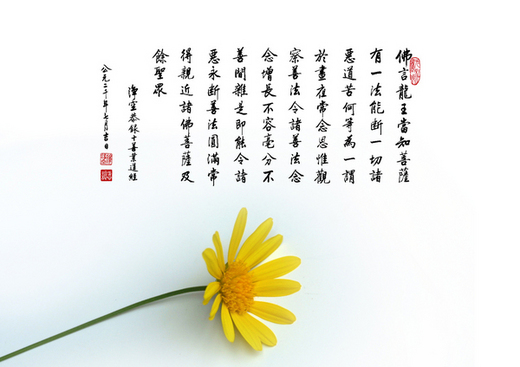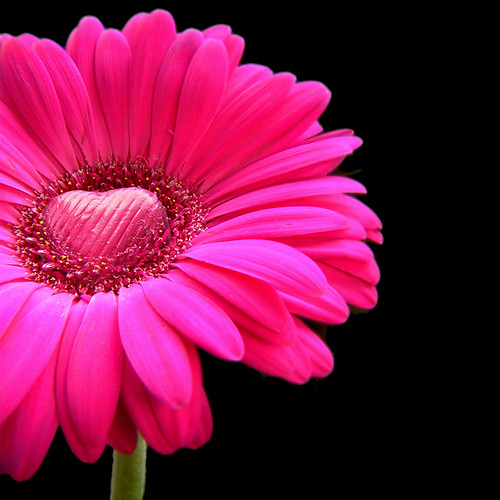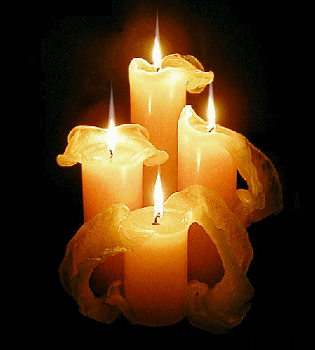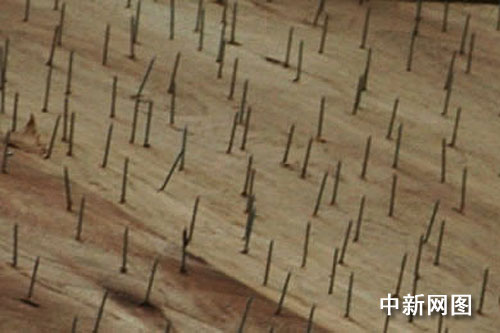愛「福」的人!
人應互相幫助、彼此關懷。我們看看這個「人」字,恰好只是兩劃,而且互相倚
靠、不能間離,或是少一畫,否則就不像「人」了;還有字劃的長短、上下要配合得
好,「人」字才能寫得美。
人生也是一樣,人與人之間能互相幫助,才是美好的人生!佛陀也是如此教育弟
子們,並且以身作則教導大家。
佛陀在世時,僧眾共同生活,都是靠群體和敬共同維持僧團教規。當時僧團中有
位阿那律尊者,每次聽佛陀講經時,他總是不知不覺地睡著了。當佛陀一開始講,他
就打瞌睡;等佛陀宣講完畢,他又醒了,幾乎每次都是如此。
有一天,佛陀呵斥他,嚴厲地說:「阿那律陀!你為何如此懈怠!你知道嗎?若
墮入蛤蚌身,一睡就一千年!」阿那律陀聽到佛陀的責備,又看到佛陀少見的怒
容,他頓時睡意全消。從那時起,他發憤
努力,精進用功不懈,甚至於不讓眼皮合上,即使已經非常疲倦,但是他仍然不願意
閉眼休息,他覺得這是自己該振作精進的時候了。
然而人卻不能缺少糧食和睡眠,睡眠可以養神,也能夠保護眼睛,阿那律陀連續
幾天不睡覺,導致眼疾,結果失明了。佛陀得知他由於太過用功而致眼盲,即教他訓
練「天(心)眼」。雖然他肉眼已失
明,但他依持佛陀教導,用心勤練天眼,終於練成天(心)眼通,一切生活均能自
理,不必依賴別人。
有一天,目犍連尊者邀請阿那律尊者說:「我想出去行腳,你是否願意一起去
呢?」他說:「好啊!和你一起行腳是很光榮的事,也是很歡喜的事!」目犍連尊者
就說:「那我們是否現在出發?」阿那律尊者說:「請等我補好幾件依服之後再出門
吧!」目犍連尊者問:「這是你現在急須要穿的衣服嗎?那就等你補好後我們立刻出
發。」
阿那律尊者就拿針引線,應用天眼一針針地縫補衣服,但是,因為一時之間沒拿
好,結果線和針脫離,針就掉到地上了。他高聲喊道:「有沒有要修福德的人
呢?」當時,佛陀正好經過此處,聽到他的
聲音,於是立即彎下身為他撿起針來、並且替他穿線。佛陀一邊穿線,一邊說:「我
是愛福的人;我是喜愛修福的人!」
阿那律尊者聽到佛陀的聲音,趕緊起身向佛陀頂禮,說:「佛陀!我承受不起讓
您為我穿線啊!」佛陀說:「這也是修福的機會,那怕只是輕而易舉的服務;而且我
累生累世都是如此,點點滴滴可以幫助別人的動作我都願意做,我很珍惜機會,一點
也不輕易放過!就如我今天的福報就是過生中不斷累積所成的啊!所以至今乃至於未
來,我仍然要積福修慧!」
阿那律陀聽了,非常感動敬佩。這件事在僧團之間傳開後,大家都非常感動,因
此,大家提倡於日常生活中要互相幫助。例如眼明的人應幫助眼盲的人;行動自如的
人應幫助行動不便的人,健康的人應幫助生病的人....,每個人都互愛互助,僧團顯
得一片和睦。
佛陀總是以身作則在教導弟子們,而福報確實要一點一滴自己去累積,不可小看
一點點的善行,若輕視小善不願意做,那就沒有修福的機會了。
Saturday, May 29, 2010
Sunday, May 23, 2010
什么是病?什么是药?

什么是病?什么是药?病,即是由于不调和所起的现象,如经说:「一大不调,百一病生」。人的身体,某一部份不调和,即会有病,更会影响到全身的不调和。心的不调也是这样,我们心理若是有点反常现象,或是有了某种烦恼,便会牵连及全部精神的不安。如此说来,世间的病患就多了,从各个众生的身心,而扩大到家国、社会乃至整个世界,莫不病患重重。如一个家庭,若父子夫妻兄弟姊妹不调和,此一家庭就是有病;一个团体中的组织分子不调和,此一团体也即有病;再扩大言之,政治不上轨道,是国家病;人类不相调协,是世界病。有病即有苦,所以种种灾难,种种苦痛,无一不是导致于冲突不和而产生的病态。在个己方面,我们平常也许会自以为没有病,其实依佛法说:「人生无有不病时」,不过微而不觉罢了。人生从来离不了病。我们既生而为人,则必定有身有心,有五脏六腑等生理组织,而这些组织因素,时时发生矛盾,时时都在病中。不过若能使它倾向于调和,调和的成分多,身体就称为健康。从这个意义去看,世间的一切,有痛苦,有灾难,即无非是病。
众生有病,便需治之以药。世间的医药以及政治法律等,都可说是药;但在佛法中,药就是佛法──法药。唯有佛法方能疗治一切疾病。刚才说,病有身心、家庭、团体、国家、世界等不同病态;凡能够减除苦痛,使苦痛变成安乐的,都是药,因此可说世间什么都是药,处处都有药,不过我们不知,若懂得了就什么皆可治病。过去有位学医的,将要毕业的时候,医师为欲考验他的学力如何,便命他上山采药,要他见了药都采了来。结果他去了一天,仍然空手回来。医师问他何故空手而归?他说满山的树木花草,土石沙铄,样样是药;药太多了,叫我从何采起!这是说,世间一切都是药,都可以治病,问题在用药的人是否理解药性,会不会应病与药。佛法是不定法,众生有种种病,佛就用种种法药去对治,因为佛法是依众生的病而施设的,所以说众生有八万四千烦恼,佛说八万四千法门。有了什么病,就治以什么药,若拘执为这是药那不是药,那就离佛法远了。
Thursday, May 20, 2010
感恩報恩,覺悟有情

《八大人覺經》「第五覺悟:愚癡生死,菩薩常念,廣學多聞,增長智慧,成就辯才,教化一切,悉以大樂。」早會時間,上人引此經文說明凡夫與菩薩不同的生命態度。
人生在世,皆受大地眾生、父母、師長之恩。菩薩覺有情,常念四重恩──感念父母生養、愛護之恩;感念學校、社會上所有對自己有啟發者的「師恩」;視天下長者為家中尊長般尊重,敬愛年紀相仿者如自己的兄弟姊妹、對年幼者如同自己兒女般疼惜,是感「眾生恩」;敬天愛地,感恩氣候調和使生命受保障,則是感「國土恩」。
然而凡夫愚癡,觀念偏差,不知恩、不圖報,且不尊重自己、作賤生命。上人感嘆:「將生命當成鑽石般珍惜,自愛愛人,是最有價值的人生;輕視生命、作賤自己,自傷傷人,擾亂家庭、社會,破壞大地,則是愚癡人生。」
慈濟大學醫學系三年級本學年大體解剖課告一段落,昨天為大體老師舉行火化入龕暨感恩追思。此次大體老師中,亦有熟悉的慈濟人——彰化蕭家棟、高雄邱國權師兄;上人思其過往付出與大愛言行,不捨之外,亦為貼心弟子的大捨奉獻引以為傲。
「他們體會到人生無常,發大心『能捨一切諸難捨』,效法佛陀『頭目髓腦悉施人』,故在身後奉獻大體;實是有智慧者。」上人稱歎他們身體健康時投入慈濟,以身教、言教啟發周遭親友;往生後成為「無語良師」,指引醫學道路,人品典範長存。
「每位大體老師都將自己的生命價值提升如鑽石,將人生運用得淋漓盡致;往生後且以身示教,成為醫海領航師,讓學生有機會『廣學多聞,增長智慧』,傳承覺有情的無私奉獻精神,實難能可貴!」
Wednesday, May 19, 2010
Monday, May 17, 2010
Life, Like a Diamond

In this world, there are people who see life as a very valuable gift. They feel it to be as precious as a diamond because with it, they can make a contribution to the world and make life better for others. In their thinking, life is to be made use of, and they take care in using it wisely, with love for others.
In Tzu Chi, there are many people who live their lives with such a perspective. And so, they live very fully, seizing every moment available to them to contribute and give. They may serve as mentors to young people, volunteer in the hospital, or visit and care for people in need in their community. Having nurtured a mindset of making the most of life to create good, they think in the same way when faced with the prospect of death. Therefore, they willingly donate their bodies for use in medical education. They know that this means their bodies will be opened up by medical students to study the human body's internal structure. They know that in the process, many incisions will be made to their bodies. But, they say, "The students can make hundreds of wrong cuts on my body—my only hope is that when they become doctors one day, they will never make a single wrong cut on a real patient."
Because of this spirit, these body donors are known by Tzu Chi University's medical students as "silent mentors". These silent mentors do not only teach the students about human anatomy. The most important things they teach the students are matters of life, issues of heart.
During the funeral, students dedicate a bouquet of flowers to the relatives of silent mentors. (Photo by Hsu Rong-hua)
When medical students begin their human anatomy course at Tzu Chi University, they are introduced to their "silent mentor"—instead of being a nameless cadaver, there is a name and life story connected to every body donor. Knowing about the donor's life and most especially their last wishes in donating their bodies, the students come to understand that the donors willingly made this gift because they wished to relieve the suffering of future patients. With this understanding, the students begin to think more about relieving suffering, and their effort to master medical skills becomes one for the sake of healing patients. The noble calling of the doctor begins to have a place in their hearts, until it becomes an aspiration that comes from deep within them. Then, despite the long and difficult training to become a doctor, they approach it with passion and dedication, because all of it holds meaning. They are motivated onward by the spirit of selfless love for humanity.
Such a spirit is deepened through the students' opportunity to visit their silent mentor's family members. Going to the house of the family members, they hear about what kind of person the silent mentor was while alive. All this brings home to them the greatness of such an act of giving, the great compassion and wisdom behind it. For many people in society, it is hard enough to donate their hard-earned money to charity, much less to donate their own body. And, most people are not willing to let their body or the body of their loved ones be handed over to others, much less to be used for incisions and practice. It takes a certain kind of insight to rise above all these attachments and understand the value of such a donation. It also takes profound wisdom and compassion to be able to really let go and give, for both the body donor and the family members.
Experiences such as these provide very rich learning for the students. They open the students to life, to their fellow human beings. The spirit of gratitude, respect, and love toward humanity begins to grow in their hearts. They discover life's value and meaning. Then, after completing their training, they make the most of their training and skills to serve humanity, by being a humane doctor.
Indeed, when people understand life's value and meaning, they will make use of their lives wisely, to bring benefit to others. Like the body donors, they may be but ordinary people. But, ordinary though they may be, they nevertheless have the power to awaken in others an understanding of life and a selfless love toward humanity, such as with the medical students. Awakened, these others will go on to make use of their life to benefit humanity.
Isn't such a life like a diamond?
From Dharma Master Cheng Yen's Talks
Compiled into English by the Jing Si Abode English Editorial Team
Dew

At this very moment, different people are doing different things. Some are caring for people in need and benefiting their community. Others are acting in a way that creates problems. This all takes place in the same second---each person uses that same second differently. The consequences of these actions, however, are also very different, and they have different impacts on our communities, society, and planet.
When many people have a heart of goodness and a mentality of helping others, the world can become a wonderful spring-like place, with all things thriving and growing abundantly.
Each person with an altruistic heart is like a drop of dew. When many droplets of dew settle on the land, the soil draws moisture and is amply nourished. When all things growing on the land flourish, Nature flourishes. But just as every drop of dew accumulates, when there are many people whose hearts are not upright, it likewise has a powerful impact.
Even though this might not be something we think we can see happening, the consequences are already affecting us. Look, for example, at how the climate has changed as a result of human activities. This has not only brought about extreme weather such as hurricanes and typhoons, but also the disasters which are occurring around the world, often at the same time. There are major earthquakes, powerful hurricanes and typhoons, devastating floods, and fires that ravage vast tracts of forest.
These disasters result from the cumulative impact of the actions of each one of us on the planet, at every moment. In our daily lives, there are many choices we can make which will either protect the environment or bring harm to it. Small as these choices and actions may seem, our planet feels their effects greatly.
How do we make these choices? It seems it is really a matter of state of mind---whether our mind is governed by our wants or is one of peace and contentment. This state of mind determines the direction of our actions. Each action has its consequences, and given the cumulative effect of each and every action, the consequences become far-reaching.
Most of us, however, seldom notice this. Our minds are caught up in the moment's feeling of pleasure when a want is satisfied. But, if we look farther down the road, what kind of path are our actions paving?
In the Buddhist sutras, Shakyamuni Buddha speaks of bodhisattvas (Sanskrit for "awakened beings"), people who are described as "awakened" because of their insights into life's truths. Two of these insights are that life is impermanent and our world is fragile. Bodhisattvas encourage people to look deeply into such truths and discover the ever-changing nature of all phenomena. If people can observe and understand this, their mindset will begin to change. Awakening this goodness within people is one of the ways the bodhisattvas fulfill their great vow of devotion to the world.
Emulating the awakened beings, Tzu Chi volunteers strive to wake up to life's truths as well as awaken the goodness in others' hearts. In their acts of charity, such as the disaster relief mission to quake-devastated Haiti, the volunteers not only give aid but share with people the spirit of love and giving. They do this because they understand that when people's hearts are full of goodness and they take actions motivated by goodness, they can change the world around them. Their society will become more peaceful and harmonious; and the resulting care for and protection of the wider environment will enable Nature to return to her balance and order. The planet will be a safer place to live.
At every moment, every single person's effort makes a difference—just as dewdrops, tiny and seldom noticed, combine to nourish and revitalize our Earth.
Compiled into English by the Jing Si Abode English Editorial Team
Sunday, May 16, 2010
The Heart of a Bodhisattva

At the time of spring, the start of the four seasons, everything is growing; the land is full of life and vitality and gives a feeling of freshness.
In the heart of the bodhisattva, it is always spring; a gentle breeze blows there, and the water of the Dharma nourishes their inner land.
When we first encounter the Dharma and experience a moment of understanding and awakening, we feel a sense of joy. This is an encounter with our Buddha nature. This joy comes from touching the Dharma with our heart. A bodhisattva seizes this moment of joy and Dharma and keeps it always.
Bodhisattvas act in accord with the Dharma, and their hearts are broad and pure. When they look, they look with the heart of understanding. They are always looking for ways to help people and solve their problems. At every moment, their mind is open to learning the Dharma, from anyone they meet, in whatever they do. When they successfully help a person, spiritual joy fills their heart. The spring sun is always shining deep in their heart.
Their heart is very big, embracing all the things in this world. This is what Buddhism teaches—to open our heart wide and embrace the universe. The Buddha tells us that our heart can create all things. When we give rise to unwholesome thoughts, we can create hell. On the other hand, if we give rise to wholesome thoughts, heaven can be here now.
Buddhists believe what happens in our world is the result of the karma all of us collectively create. If this karma is negative, the outcomes include natural disasters which bring suffering and sorrow. Yet, if we think and do good in our everyday life, we can bring good fortune and blessings to the place we live.
Bodhisattvas know that if people can have a good heart and good thoughts, they can create many blessings. Because of this, they take on the work of inspiring people to do good. When encountering others, they try to reach out to the goodness in the people's hearts and awaken their selfless love for others—Great Love, and then guide them to express this love in action.
They understand that to enjoy the fruits of blessings, one must first plant the seeds of blessings. That is why they encourage people to create blessings by doing good for others. When a lot of people are doing good, collective good karma is built up. When more and more good karma is accumulated, it "dilutes" the existing collective bad karma. Misfortune is then turned around, and people experience blessings.
The heart of the bodhisattva is full of goodness. This goodness is continually sprouting and growing in the eternal spring of their heart. With their goodness, they bring a power of transformation to our world.
Compiled into English by the Jing Si Abode English Editorial Team
Saturday, May 15, 2010
妙法蓮華經如來壽量品

上人又要出門行腳了,在揮別精舍常住二眾弟子時,語重心長開示道,莫道「無
常有何稀奇」,認為無常不足為奇者,這就是凡夫無法進步的原因。時日消逝,生命
遞減,若慧命也絲毫沒有進步,最大的障礙,就在面對無常,雖「知」但欠缺智
慧,所以就「不智」;也就是說,「知」道有無常,但少了「日」,那分清淨光明的
心沒有發揮,只是滿心的污染、煩惱之「知」而已。
就醫學來講,有時長期服用某種藥物,會發生抗作用,此時藥就失去效用。就如
《法華經》中曾譬喻,有位父親雖是好醫師,但孩子有病,就是不肯接受父親的治
療,父親十分無奈,便出門遠行。等到
很久之後,孩子才感到不能沒有父親,當要尋找父親時,卻有人受父親之託,前來告
知父親已死的訊息。此時,孩子才知道,父親事實上是好醫師,待要請父親治病,一
切已來不及了。
「學佛而不尊師重道,則心中根本無道場,師長盡責教導,若自己不以道業為
重,沒有負起照顧自己慧命的責任,為人師的也無可奈何。不能尊師重道,甚至輕法
慢教,這也就如面對此次大地震,自己不心生警惕,只是『知』而無『日』的照
耀,所以就沒有智慧,發揮不出智慧的生命!」
钉子

从前, 有一个脾气很坏的男孩,
他的爸爸给了他一袋钉子,告诉他每次发脾气或者跟人吵架的时候就在院子的篱笆上钉一根。
第一天,男孩钉了37 根钉子。后面的几天他学会了控制自己的脾气,每天钉的钉子也逐渐减少了。
他发现,控制自己的脾气,实际上比钉钉子要容易的多。终于有一天,他一根钉子都没有钉,
他高兴地把这件事告诉了爸爸。爸爸说:从今以后,如果你一天都没有发脾气,就可以在这天拔掉一根钉子。日子一天一天过去,
最后,钉子全被拔光了。爸爸带他来到篱笆边上,对他说:儿子,你做得很好 , 可是看看篱笆上的钉子洞,这些洞永远也不可能恢复了。就象你和一个人吵架,说了些难听的话,你就在他心里留下了一个伤口,像这个钉子洞一样。插一把刀子在一个人的身体里,再拔出来,伤口就难以愈合了。无论你怎么道歉,伤口总是在那儿。要知道,身体上的伤口和心灵上的伤口一样都难以恢复的。
Thursday, May 13, 2010
Sunday, May 9, 2010
哪個是真「我」?
想想,我們的身體真是一個小乾坤,包含了很多組織,也有許多微生物,到底有多少?連自己都不知道。這些東西哪一樣真正是自己的?頭是「我」嗎?但是它的名稱是頭,手是「我」嗎?也不是,它叫做手。各種器官都有不同的名稱,而且功能都不同,只是以一個總稱叫做「我」。
「我」不過是一個假名詞,你也說「我」,我也說「我」,你說的「我」,是我說的「你」,其實,這都只是一個假名相;既然是因緣假合之物,沒有一項稱得上是真的,也就沒有一個真正的「我」。
生命是大自然的共同體,「我」只是其中的一小部分,不必太執著私我,更不需要為了名利、地位而計較。生活在人世間,要明白普天之下人人的幸福,就是我的幸福;人人的苦難,就是我的苦難。所以,我們應該要積極付出自己的良能,造福人群,讓生存的環境更加和諧安康,這才真正具有生命的意義。
上人開示於2000年4月29日
「我」不過是一個假名詞,你也說「我」,我也說「我」,你說的「我」,是我說的「你」,其實,這都只是一個假名相;既然是因緣假合之物,沒有一項稱得上是真的,也就沒有一個真正的「我」。
生命是大自然的共同體,「我」只是其中的一小部分,不必太執著私我,更不需要為了名利、地位而計較。生活在人世間,要明白普天之下人人的幸福,就是我的幸福;人人的苦難,就是我的苦難。所以,我們應該要積極付出自己的良能,造福人群,讓生存的環境更加和諧安康,這才真正具有生命的意義。
上人開示於2000年4月29日
世間萬物本質皆「空」,其用妙「有」
透徹真理,萬物皆空──一切可見之物,皆是四大假合、會因聚緣而來;將一件物品分解、分析到最後,只是地、水、火、風等基本元素的組合,終歸於「空」。然而生活中一切用物皆是「有」,如棉衣、棉被,有其實體,而能起禦寒的作用,雖是四大假合,卻具「妙有」之理。
靜觀自然萬物 處處顯現成住壞空
上人於晨語譬喻解說「真空妙有」之理──一件棉被所用的棉絮,是從一顆種子播入土中,經過農夫細心耕耘,有適合生長的陽光、空氣、水分,讓它萌芽生長,待其開花、結果,再經由採收、加工,而用來填充棉被;棉質的被單亦是運用採收後的棉絮,經揉織成棉布,再經過裁縫而成,套在被心之外,成為一件完整的棉被。從耕種棉花到製成棉被,需要經過一段長久的時間,也要耗用許多人力,才能使棉被從無到有,發揮作用。
嶄新的棉被使用了一段長時間,漸漸地,被單破損了、被心變質鬆脫,直到毀損不堪使用而被丟棄,或是焚化或是土埋,終會隨著時間腐壞分解而歸於「空」,不復見「棉被」之體。
「物質分解再歸零,就是『空』;天下萬物在形成之前,都是『空』,經過時間、四大、人工等相互結合、化零為整,就『有』了可供使用的物品,只是經過不同的因緣而有不同的名稱;再經過一段時間,又再化整為零而歸於空無。」
心中有戒不受誘惑,行中有定聞法不漏
上人再以人的一生解說「空」與「有」之理。「人生的生、老、病、死過程從未停歇,自因緣聚合而生,皆在微妙的行蘊之中成長、老化,直到死亡,又再歸於空無。」
「生活中的物品,我們每天使用,卻不知其道理,故不知珍惜;懵懵懂懂過日子,不知道能夠健康生活也應珍惜而善加運用。今有善因緣聞法,探討真空妙有之理,更不應空過時日。」上人愷言,若如凡夫迷茫度日,每過一天就損失了一天;得聞法理,就要靜下心來,專注思惟、用心理解。
「心若不靜,即使別人告訴我們再好的道理,也如耳旁風,心不專即聽不清楚,所以必定要使心寂靜。閉關取靜非真功夫,要能做到身處人群中也能靜心,對周圍的境界明朗清楚,而心不受外境所擾。這必須靠我們平時用功,用心了解生活中的人事物相;深奧的道理,是由每天的觀察與探討中點滴累積而體會。」
上人教示,佛陀是「悟真空者覺妙有」,學佛者即須「好寂靜解空妙理」,在生活中長養慧根,「慧根深植累世情」。「並非決心修行就全然放棄世間的一切,要拉長情、擴大愛;有智慧,則不受世間物質迷惑,衍生貪、瞋、癡等無明。面對一切人、事、物,用智慧判別、平等觀之;不放棄任何一個人,但是對其身不起貪戀之心。」
上人續示「戒定受持聞不忘」──心中有戒不受誘惑,行中有定聞法不漏,在芸芸眾生中,以「戒」的力量防非止惡,堅定心志;唯有修除煩惱習氣,善法入心,才能長久留存。
證嚴上人開示於2009年12月5日
本文摘自:《證嚴上人衲履足跡》2009年冬之卷
靜觀自然萬物 處處顯現成住壞空
上人於晨語譬喻解說「真空妙有」之理──一件棉被所用的棉絮,是從一顆種子播入土中,經過農夫細心耕耘,有適合生長的陽光、空氣、水分,讓它萌芽生長,待其開花、結果,再經由採收、加工,而用來填充棉被;棉質的被單亦是運用採收後的棉絮,經揉織成棉布,再經過裁縫而成,套在被心之外,成為一件完整的棉被。從耕種棉花到製成棉被,需要經過一段長久的時間,也要耗用許多人力,才能使棉被從無到有,發揮作用。
嶄新的棉被使用了一段長時間,漸漸地,被單破損了、被心變質鬆脫,直到毀損不堪使用而被丟棄,或是焚化或是土埋,終會隨著時間腐壞分解而歸於「空」,不復見「棉被」之體。
「物質分解再歸零,就是『空』;天下萬物在形成之前,都是『空』,經過時間、四大、人工等相互結合、化零為整,就『有』了可供使用的物品,只是經過不同的因緣而有不同的名稱;再經過一段時間,又再化整為零而歸於空無。」
心中有戒不受誘惑,行中有定聞法不漏
上人再以人的一生解說「空」與「有」之理。「人生的生、老、病、死過程從未停歇,自因緣聚合而生,皆在微妙的行蘊之中成長、老化,直到死亡,又再歸於空無。」
「生活中的物品,我們每天使用,卻不知其道理,故不知珍惜;懵懵懂懂過日子,不知道能夠健康生活也應珍惜而善加運用。今有善因緣聞法,探討真空妙有之理,更不應空過時日。」上人愷言,若如凡夫迷茫度日,每過一天就損失了一天;得聞法理,就要靜下心來,專注思惟、用心理解。
「心若不靜,即使別人告訴我們再好的道理,也如耳旁風,心不專即聽不清楚,所以必定要使心寂靜。閉關取靜非真功夫,要能做到身處人群中也能靜心,對周圍的境界明朗清楚,而心不受外境所擾。這必須靠我們平時用功,用心了解生活中的人事物相;深奧的道理,是由每天的觀察與探討中點滴累積而體會。」
上人教示,佛陀是「悟真空者覺妙有」,學佛者即須「好寂靜解空妙理」,在生活中長養慧根,「慧根深植累世情」。「並非決心修行就全然放棄世間的一切,要拉長情、擴大愛;有智慧,則不受世間物質迷惑,衍生貪、瞋、癡等無明。面對一切人、事、物,用智慧判別、平等觀之;不放棄任何一個人,但是對其身不起貪戀之心。」
上人續示「戒定受持聞不忘」──心中有戒不受誘惑,行中有定聞法不漏,在芸芸眾生中,以「戒」的力量防非止惡,堅定心志;唯有修除煩惱習氣,善法入心,才能長久留存。
證嚴上人開示於2009年12月5日
本文摘自:《證嚴上人衲履足跡》2009年冬之卷
Friday, May 7, 2010
the meeting dishes
meet, can bring happiness, understanding, realization, and of course all kind of memories to both party.
We cannot deny that not all the meeting are sweet, but still, the 'taste' of each meeting mostly depend on us.
The way we going to treat the other party is the main ingredient for the 'meeting dish'.
We can choose to be nice to others or the other way round. It is all depends on us. So, let us cook each and everyone of our 'meeting dishes' with our genuine hearts so that they will taste just as nice and left us sweet memories.
Take from comment of chloroplast in 风你在做什么?
so nice^^
We cannot deny that not all the meeting are sweet, but still, the 'taste' of each meeting mostly depend on us.
The way we going to treat the other party is the main ingredient for the 'meeting dish'.
We can choose to be nice to others or the other way round. It is all depends on us. So, let us cook each and everyone of our 'meeting dishes' with our genuine hearts so that they will taste just as nice and left us sweet memories.
Take from comment of chloroplast in 风你在做什么?
so nice^^
Wednesday, May 5, 2010
观自在
Subscribe to:
Comments (Atom)

